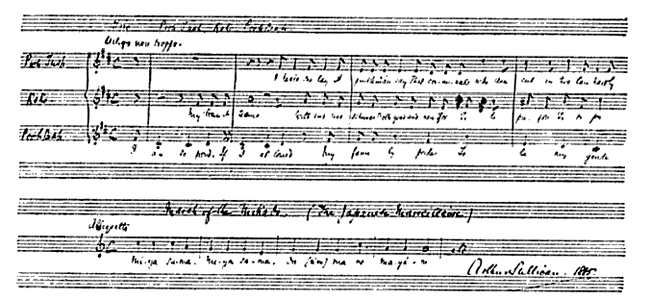 |
 |
||||||
![]() HAVE been invited to write a few of my own personal reminiscences of
the incomparable Arthur Seymour Sullivan. I have read so many brilliant
and touching descriptions of his extraordinary career and genius, by our most
able critics, that I feel nothing more can be said. Yet in my own heart I
conscientiously feel that it is impossible to say too much of him. As our foremost
English composer, his works — especially the Light of the World, the Martyr of
Antioch (a glorious inspiration), and the Golden Legend — will be sung and praised
in years to come, when we are gone and forgotten.
HAVE been invited to write a few of my own personal reminiscences of
the incomparable Arthur Seymour Sullivan. I have read so many brilliant
and touching descriptions of his extraordinary career and genius, by our most
able critics, that I feel nothing more can be said. Yet in my own heart I
conscientiously feel that it is impossible to say too much of him. As our foremost
English composer, his works — especially the Light of the World, the Martyr of
Antioch (a glorious inspiration), and the Golden Legend — will be sung and praised
in years to come, when we are gone and forgotten.
Many of his songs will live — as still lives the "Adelaïde" of Beethoven — who was not even appreciated in his time, any more than was the youthful poet Keats. Sullivan was appreciated in his lifetime, but will be more so in many years to come.
It is not, however, in my province to speak of his works, but only to speak of a kind-hearted gentleman as I knew him personally and who was the means of changing my own career in life. It was quite beyond my power to express my deep gratitude to him, and utterly impossible for me to say how much I feel the loss of one to whom I owe professionally nearly everything.
I have dropped my tear, and propose in this short remembrance of him to deal entirely with the lighter side of his nature; his humour; his wit; his hospitality and home life.
I had met Sir Arthur's brother, Fred Sullivan, when he played in Cox and Box, at the Gaiety Theatre. He was afterwards the first and incomparable Judge in Trial by Jury. I was reporting at Bow Street at the time, and he would often drop in to hear a case, as did Irving, Toole, George Belmore, and other well-known actors; and Fred Sullivan and I became as good friends as is the case now with his son Herbert Sullivan, who is practically the adopted son of our late English Master, to whom I had then no opportunity of being introduced. I had sung "From Rock to Rock" (Contrabandista), and had sung songs and duets front Cox and Box as an amateur, and my great ambition was to be introduced to the composer. The chance came.
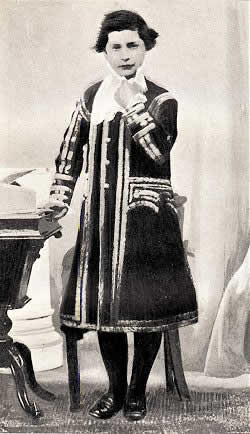
About 1875 or 1876 I was asked to play one of the jurymen in Trial by Jury, to be given at a benefit matinée. After one of the rehearsals at the old Haymarket Theatre, knowing the late Arthur Cecil to be a great friend of Sullivan, I begged for an introduction. I was a budding and extremely amateurish entertainer of the John Parry school, but Sullivan was kind enough to say that he had heard of me, and hoped to hear me himself. One cannot realise what that means to a beginner.
At last "Society" for some reason or other, began to open its exclusive gate and let me in by inches. Without being ungrateful to Society, I could not help thinking that in those days I was admitted because it could rely upon me for a gratuitous song. But I had my reward! I frequently met Arthur Sullivan. That was sufficient reward. Arthur Sullivan was amused at my work at the piano, and whenever an opportunity occurred he most generously placed me to the greatest advantage. The great chance came. Arthur Sullivan and I were dining at the late Lady Sebright's, and he insisted on my returning to his flat, at 9, Albert Mansions. His great friends Frederic Clay and Alfred Cellier, the composers, were present. We all played and sang till the dawn had far advanced. In November 1877 came to me the well-known letter from Sullivan asking me to play in the Sorcerer!
By appointment I went to Albert Mansions, and Arthur Sullivan sat at the piano with his inevitable eyeglass and cigarette, and he sang the patter song"My name is John Wellington Wells." He said, "Can you sing that?" I had the impertinence to say, "I think I can "
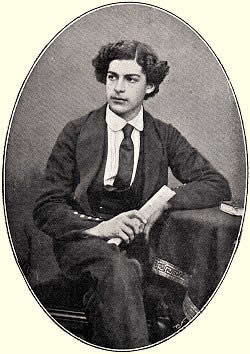
That was the beginning of a twelve years' engagement with Gilbert and Sullivan, under the management of my ever esteemed friend D'Oyly Carte at the Opera Comique, and subsequently at the newly built Savoy, the first London theatre illuminated by electric light.
At the house of Sir Arthur's sister-in-law, widow of my old friend Fred Sullivan, I had the pleasure of meeting Mrs. Sullivan, the mother of these two clever young men of whom she was so proud. She was so sweet and so gentle, that it was quite easy to see from whom Arthur S. Sullivan inherited his charm of manner, his extreme modesty, and his kindness.
But it was as a host himself that he excelled par excellence. He did not seem to mind whether he was host, hostess, or servant. At his evening parties at 1, Queen's Mansions — to which he moved — he always tried to be nobody, but succeeded; without effort, in being everybody.
He was in great personal favour with H.R.H. the Prince, and an intimate friend of the late Duke of Edinburgh (Duke of Saxe-Coburg-Gotha), and whenever they dined with him — which they often did — he always prepared an after-dinner programme. I do not suppose any one ever refused Arthur Sullivan's invitations, and no artist refused to sing for him. After dinner the programme began rather seriously. Albani would sing, Edward Lloyd, Tosti, Eugene Oudin, and many of the principal Italian opera singers; and Mrs. Ronalds — with all due respect to the profession of vocalists — would occasionally sing "The Lost Chord" in such a manner and with such heart as I have never heard that everlasting song sung before or since.
Then followed the humorous element. Rutland Barrington, my brother Weedon, then an artist, and occasionally an amateur actor; were several times called upon to do a special "turn." We three generally played some nonsensical piece which had been done at the annual Christmas juvenile parties at my house. These pieces were after the fashion of Henry J. Byron's back drawing-room burlesques. It was fun to us, fun to the Royal and other guests, and fun to the accompanists, who were either Arthur Sullivan, Frederic Clay, Alfred Cellier, or his brother François.
On one occasion Sullivan wrote to ask me if I would drop in that evening — "only a small party." I dressed as quickly as I could after playing my part in one of his operas at the Savoy, took a two-wheel cab and "dropped in" just before midnight. The Prince of Wales was there, the piano was wedged into a corner window, and a large standard oil lamp stood close to the bass keys of the instrument. There was scarcely a yard of room. Quite enough for an accompanist, but not enough for me. I felt very nervous, and asked Arthur Sullivan if the piano could be shifted out a bit? He seemed to revel in my temporary misery, and made some remark about the piano's feelings — that it would feel hurt if it were disturbed.
I replied, "Well, I'll do my best. What would you like me to do?"
Sullivan said, "Do what you like — but don't knock over the lamp!"
He was a most excellent raconteur, and brimful of humour. He occupied a box one night at the Savoy during the run of Patience. I was playing Reginald Bunthorne, with a terrible face-ache. My left cheek was so swollen that it resembled a small pumpkin, and I was in great pain. He came round to my dressing-room between the acts, and said "I'm sorry to hear you are in such pain." I replied that I did not mind the pain, but felt that I looked such an awful sight!
Sullivan answered, with his usual genial smile, "Not at all, my dear G. G.: I assure you it is a great improvement. You never looked better."
In these little experiences I am making no effort to be chronological, but just relating facts and incidents as they occur to me at the moment. During my twelve years' association with him on the stage in his comic operas in conjunction with W. S. Gilbert — the finest librettist of our time — I found him most courteous even to the humble members of the company. He had reason frequently to complain, but his complaints were kindly expressed. He was very strict, but always gentle. Naturally the ladies and gentlemen of the chorus were not always infallible. Arthur Sullivan detected a wrong note in a moment, but he seemed rather to delight in the fact that my old friend Rutland Barrington and I were the worst of the lot. Barrington invariably invented his own tune while I sang no time at all. I am speaking of the rehearsals when our music was first handed to us.
This generally ended in a private séance — as Sullivan termed it—at his own home, where we were privately corrected and coached by our composer: a courteous act, which saved correction before the rest of the company.
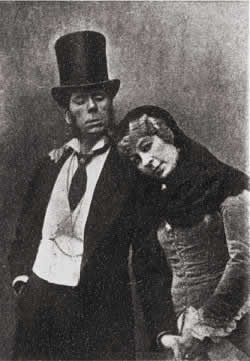
The first band rehearsal of a new opera was a trying ordeal. How we all -dreaded it! We generally felt pretty well at home with the pianoforte, but when it came to the band, with Sullivan's marvelous orchestration — tunes, words, everything went out of our heads. Flutes suddenly seemed to be having a lark in the treble, clarinets spasmodically caroused in the middle, and the bassoon was enjoying himself now and then most humorously in the bass. We used to roar with laughter at the orchestration of some of these numbers, as much as we were silenced with respect and admiration for others of his beautiful work. He had a knack of cutting up the rhythm of the verses of Gilbert, which now and then almost perplexed the famous author.
Gilbert had no knowledge of music whatever, and "he himself had said it," that he only knew two tunes. One was "God Save the Queen," and the other wasn't ! But he could write for a musician — to the envy of all lyrists of his time. In a chorus from the Pirates of Penzance Sullivan cut up the metre in a most amusing fashion.
The words — if I remember
rightly — were that the General's daughters were to be married to the Pirates —
Who is located in this vicinity"
If you read Sullivan's musical interpretation, it runs:—
| "By a Doctor of — | |
| Divinity — Who is lo- cated in |
|
| This vicinity." | |
Sullivan used to be sometimes as innocently pleased with a newly composed number, which he brought under his arm to a rehearsal, as a child with a new toy. He came down one day with that beautiful sextette in Patience, and remember his saying to the singers, "I think you will like this. It is Dr. Arne and Purcell at their best." The singers did like it, and moreover were much touched by the sweet effect of the pure harmonics. A chorus gentleman came me quite grieved, and on my asking him what was the matter, replied, "It's positively wicked to put a beautiful thing like that into comic opera." The man, who had sung in choirs and other places, was absolutely upset.
Sir Arthur Sullivan's infinite variety was marvelous, and it takes a strong head to realise that the Master who wrote "Wreaths for our graves the Lord hath given," could cast away for a time his beautiful and religious sentiment, and — when called upon — could produce "The Ruler of the Queen's Navee," or "The threepenny 'bus young man." Sullivan was a humorous musician to his finger
tips, but finger tips had nothing to do with his work. It was there that one
discovered the soul of the man.
I will not deal with his love and kindness to his family, whom he never forgot. He was devoted to his nephew Herbert, who, I remember, came to one of my organised juvenile parties in his "Bluecoat suit." A dear little chap, with all tile charm of his uncle. But Sir Arthur went as far as Los Angeles — away west — to see the widow and children of his beloved brother Fred. Few relations do this sort of thing nowadays.
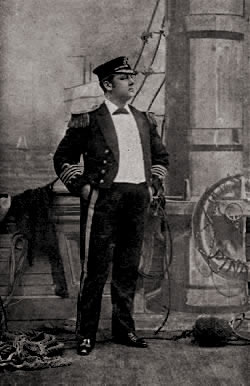
Let me return to my old love "The Savoy." Sullivan, as every one knows, was fond of a parody, in his finales, of the old- fashioned Italian Opera. Sir Augustus Harris once said to me — "Arthur Sullivan is killing Italian Opera!" Sir Augustus still managed to pull Italian opera out of the mire, and place it on a German and French pedestal.
At a rehearsal of one of these finales — I think it was the termination of the first act of the Sorcerer — Sullivan made us all come (including the chorus) in a crowd to the footlights, and sing with outstretched arms over the footlights, towards the gallery, à la Italian method. The principal singers were of course in front. We were unsatisfactory. Sullivan tapped his desk, and the orchestra stopped. The composer screwed his eye-glass into his eye and addressing us individually said:—
Don't you understand I want you to think you are at Covent Garden Opera, not at the Opera Comique? I want you, Miss —, to imagine you are Adelina Patti and you, my dear Grossmith, are dreadful — there is not enough Mario about you."

I saw what he meant, and exaggerated the Italian mode, and nearly fell over the footlights into the orchestra.
Sullivan with a smile said, "Ah! that's better. Capital ! Do even more. You needn't consider your safety."
This was long before the days of Calvé, Melba, and Jean and Edouard de Reszke.
At one of the band rehearsals of a new opera, Sullivan made a complaint to the chorus. He said, "Ladies and gentlemen, you must watch me. Please look at me."
The choral part was tried over and over again. At last Sir Arthur detected an absent-minded lady paying no attention to the beat. She evidently was staring up at the roof, thinking of one who might one day be all to her. Sullivan addressed her, and said, very kindly but humorously, "If you have any any personal objection to look at me, I will not press my request, and will only ask you to look at my bâton." Nobody laughed more than the girl herself.
During a short recess in the autumn at the Savoy, about fifteen or sixteen years ago (Princess Ida was running — or rather had stopped running for a short time), Arthur Sullivan took Stagenhoe Park, near Welwyn, and kindly asked Mrs. Grossmith and myself to stay a week or so. What a delightful visit . He had a charming house-party, including some American ladies — Mrs. and the beautiful Miss Adèle Grant (I adore Americans), and I never remember a more
festive gathering. We drew lots as to whom we should take in to dinner. In
the morning we played lawn-tennis after breakfast. I have seen some bad lawn-tennis players in my time, but I never saw any one so bad as Arthur Sullivan. If he happened to be "served" with a ball, and missed it — which he nearly always did — he cried seriously "Out!"
If he returned a ball — which he sometimes did — and it went yards outside the opposite court, he said, with a complacent smile, "In." He was always the Referee as well as player, and his decision was final. He had at Stagenhoe Park a beautiful collie dog, and such a spoilt pet with us all. The dog was almost the master of the house. Host, visitors, gardeners — in fact, everybody — were engaged all day long in throwing twigs or sticks (till our arms ached) for the dog to fetch and bring back.
I said to Arthur Sullivan one day "That dear dog is vary attractive; but has he any other qualities besides fetching sticks? Is he, for instance, a good house-dog?"
"A splendid house-dog!" replied Sullivan, with a twinkle. If burglars were to enter this place and throw a stick for him to fetch, he would show them all over the premises."
Although Sullivan was supposed to be resting at Stagenhoe Park, he was working all the time. But no one ever saw him work, and it is an open secret that he worked in the late hours of the night, or rather in the early hours of the morning. He told me himself, at one of the final dress rehearsals of Iolanthe, that he had yet to do the overture to the opera — which any one can still see is an elaborate and masterly composition. He sat up till about five in the morning; never leaving his desk, and writing with an assiduity which it is almost impossible to realise.
Arthur Sullivan rested for a few
hours and sent his score off to be copied for the band. He came to the theatre
looking fatigued and extremely pale He said to me: "I've done it, but I'll
never do it again." Any one could have undertaken an arrangement of his tunes for an overture, but he set his mind on doing a special introduction, and he did it, although there was practically no time to do it in.
I have not often seen Sullivan write music, but I caught him one day at Queen's Mansions, and I was absolutely astonished at his rapidity.
He said, "Help yourself to a cigarette — I shan't long."
I smoked and watched: I took up a paper and tried to read; but for the life of me I could not keep my eye from his hand and pen. To an unpractised person like myself it seemed marvelous. Having only just left off reporting at Bow Street, I said. when he had finished, "Why, it's like writing shorthand!"
"Yes," replied Sullivan but it's much quicker."
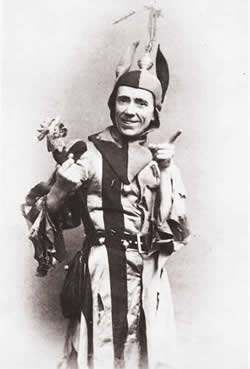
I fear I was always a little worry to Sullivan and Gilbert — especially the latter but they both were most indulgent to me. In the Yeomen of the Guard I had to sing a song which I liked very much on account of the words; but Sir Arthur had introduced some awkward intervals, with a dash of chromatics, which, after a fortnight's study, I could not sing, and could not even speak through the tune — a favourite custom of mine. I always was, and always shall be, a most terribly nervous man, and I began to get frightened at the result of my interpretation of the song.
One day at rehearsal I approached Sullivan, who was both worried and flurried.
I told him that I could not
get on with the tune — a fact which he easily saw for himself.
I said, "Could you not alter this tune some way or other? I cannot do justice either to you, Gilbert, or myself."
He replied that he had far more important work to do, and that I must sing the music as it stood. I asked him if it were possible for the song to be omitted? He answered that it was quite out of the question, as the words of the song were not only too good, but had great bearing on the play, which was quite true. I felt very miserable, but was determined to accept the situation.
Sullivan came down a day or two afterwards with new quartettes, trios, songs, etc. He sat at the piano and began to distribute the parts to the different singers to try over. Suddenly he said: "Grossmith! here is your song. You have been a nuisance to me, and have kept me awake all night — but here you are." He handed me the tune. It was practically the same tune, but he had cut out the awkward intervals and chromatics. The change was revelation; but I have often thought of the trouble I must have given to the kind-hearted composer.
Another instance!
At a private musical rehearsal of the Mikado at Sir Arthur's house (the principal singers and actors only) I became depressed at the now famous song "Tit Willow." I thought, as far as Gilbert was concerned, that the first verse was so much more taking than the last, which was reversing the order of things. When Sullivan played the tune on his piano, it sounded like "Easy Pianoforte Pieces for Children."
Seeing my abject look, Sullivan lighted another cigarette, and said: "I see you don't care for it, but it is a question for the general public!"
He was quite right, and I never regret having sung "Tit Willow," which I must have done with encores about two thousand times at the Savoy Theatre. Gilbert never came to see his own pieces, but relied on the report of friends if anything
went wrong. Sullivan, au contraire — came down himself. On one occasion he thought Miss Jessie Bond and others, including myself, had overdone our action
business in a charming
quartette in the second act of the Yeomen of the Guard.
We all felt a little grieved, because we thought we were doing our best to keep that particular number. Some of the singers sulked, and I felt a little hurt. We
determined to sing the
quartette (or was it a quintette? I forget!) after the fashion of a choir. We got a double encore that evening, to our intense surprise. We did not get it afterwards, and Sullivan suggested that we should return to the old business, only "Don't
overdo it!"
He was most kind over it all, and chaffed us all as well as himself. He loved chaffing and therefore he and I were in one accord.
I love a little chaffing, but I have never been able to "score off " Arthur Sullivan. I met him at the grand stand at Ascot once (I do not often attend race-meetings), and he asked me the following question:—
"G. G., if it is not impertinent, how much do you pay the people who pass by you to say, 'There's Grossmith?'"
The greatest compliment he ever paid me was to arrange a song of mine, entitled "See me Reverse," as a waltz. Unfortunately for me, I had disposed of the copyright of the song (which was somewhat popular at the time) to another publisher who was not his. But it was a compliment, which I shall never forget.
I have spoken of Sir Arthur Sullivan as a splendid host, and his manner of getting up entertainments for his own parties; but he also organised special entertainments for his own friends. He composed the music for the Maddison Burnand farce Cox and Box, for a performance at Moray Lodge, then the residence of Mr. and Mrs. Arthur Lewis (the latter was formerly Kate Terry). That, I believe, was Sullivan's first attempt at comic opera. Apropos of Cox and Box, he once asked me if I would play in it at Mrs. Freake's (the late Lady Freake). The cast was : —
| BOX | Mr. Arthur Cecil. |
| COX | Mr. George Grossmith. |
| BOUNCER | Mr Corney Grain. |
| PIANO | Mr. Alfred Cellier. |
| HARMONIUM | Mr. Arthur Sullivan. |
I remember, before we began, Alfred Cellier said to Sullivan, "Will you play the piano or the harmonium?"
Sullivan replied, "The harmonium. It's easier."
During the last eight or ten years I saw very little of him, for I was always abroad in the United Kingdom or the United States. Sullivan lived a great deal abroad also in later year,. The last time he was my guest was about two years ago, at a rather large evening party at the Grafton Galleries, when my children (grown up) and I played in a back-drawing-room piece of foolery entitled The Parson and the Players. I wrote the piece, and did half the musical numbers, while Paul Rubens, who had just left Oxford, did the rest. Sullivan was most amused and most gracious in his compliments. He often used to say of my songs, "Wherever do you get your tunes from?"
I think I have written enough — perhaps too much. I personally loved the man who was so good to me, who began as a Royal Chapel boy in the choir. I have wondered since if he ever anticipated that the musical portion of the most impressive service at the Chapel Royal, St. James's, would consist of his own music, sung by Chapel Royal boys in their scarlet coats.
Good-bye, Arthur Sullivan! Your unfinished score still lies on your desk, but there is no one who can complete it; your pen is broken, and the music-loving world has yet to realise an irreparable loss.
Unfortunately, the original illustrations were of poor quality in the available copy and so have either been relpaced with similar illustrations or omitted.
Page modified 6 October 2011
